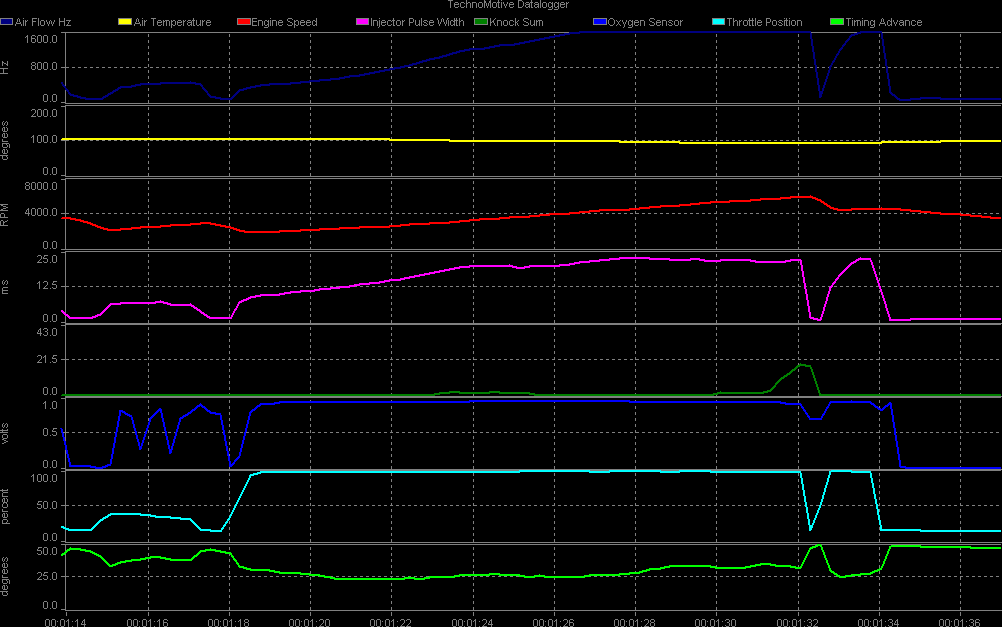|
Overview
I'd like to share this information as I think it will help you to understand what is going
on when running the car. I hope it gives you all some good insight ;-)
At the end of the page you'll find a 22 second screen shot of one small part
logged by the software during a run early in August. The Water Injection
was running, although it did nothing other than spraying a little water... It is
just not yet tuned in and I wanted to make sure everything works fine (and
it does).
The WOT run was in 3rd gear up the hill, starting at 1900 straight up to 6000
and I logged 8 items at this time. Some things to note before I come to the
interesting things:
 The air flow output of the ECU is 1606Hz max. This is only a limitation in
the output to the logger (caused by the ECU) and does not affect what the
ECU is reading.
The air flow output of the ECU is 1606Hz max. This is only a limitation in
the output to the logger (caused by the ECU) and does not affect what the
ECU is reading.
 Only 1 O2 sensor is read. We currently don't know if it is the left or
right one.
Only 1 O2 sensor is read. We currently don't know if it is the left or
right one.
 Only 4 samples per second are logged. This because NT 4.0 seems not to
like the serial port much. With Win95/98 we are getting between 20-55
samples per second with 16 items logged. Therefore the curves are not as
smooth as they should be.
Only 4 samples per second are logged. This because NT 4.0 seems not to
like the serial port much. With Win95/98 we are getting between 20-55
samples per second with 16 items logged. Therefore the curves are not as
smooth as they should be.

Details
Now have a look at the logged data and of course I'm very interested in the
knock seen around 5800. The run was made at 1.0 bars boost with a small
overboost to 1.02bars. Interestingly there was some slight knock from 2950 -
3750 where the small overboost occured. The timing got not retarded as knock
was too small.
Also check out the intake temperature (MAS). It was 104°F when I started and
within the forest the temp went down to 93°F. This proves that even with
more speed no cooler air came in to the filter :( The ambient was about
12-15 °C lower than the intake temp and this causes our intercoolers to work
overtime.
This temperature may be the cause for the timing and injector pulse width
logs. As the ECU sees that high temps, it chooses another range in the fuel
and ignition map to reduce the timing and increase the fuel. On every WOT
run in any gear I saw the timing at around 25° (the whole log was 20 minutes
with any kind of driving, very interesting) down from 38° or even 49°. On
the high knock the timing went down some degrees, but nothing spectacular.
Now let's look at the O2 sensor curve and we see that at WOT the O2 reads
damn rich 0.92-0.96 Volts. Again, I think the high intake temperature is
responsible for this as the ECU tries everything to be on the save way as
well as the fuel map simply be choosen in open loop operation (no regard to
the O2 sensor readings). At fast part throttle runs, the O2 sensor showed
good 0.84 volts. I wonder if this value changes when the ambient temp
becomes lower.
Now, the most important part : Injector pulse width. This is the time the
injectors are open during one revolution of the engine (two revolutions per
cycle on a 4-stroke). The available time for injectioning the fuel is a
function of rpm. If the time of one revolution is the same as the injector
pulse width, IDC is 100%. In the log checking out the IPW at 5200 we'll find
21.7ms but one revolution takes 23ms at 5200. Therefore the injectors have
already been at 94% IDC ! Going to 5500 we find 22ms for the IPW but at this
rpm ony 21.8ms are available. We are therefore above 100% IDC... strange,
huh ? The explanation is that this is what the ECU takes out of the fuel MAP
and sends to the logger. Of course above this rpm the injectors are just
open all the time as the ECU wants to run as rich as it finds on his MAP.
I remember an IDC of more than 90% (up to 94% if my internal memory is ok)
Jim saw on his S-AVC-R on the dyno. But this was with a cool ambient and
much colder air sucked in (12°C with open hood against 40°C on the road with
closed hood). Also the A/F snorcel device told us that the ratio was on a
good, not that rich side (around 12.8) as the O2 sensor is telling me on
this run.

Conclusions
This was a run with only a boost controller and K&N filter installed
(all other mods have been removed to provide a back-to-back test) The WI was
at idle not injecting any water. Boost was 15 psi then. Unfortunately,
the ECU wants to compensate for the high ambient temps and therefore dumps
in fuel. This causes the injectors to be maxed out extremely as well as the
fuel pump may start to show some problems soon. But I never ran into fuel
cut, hesitation or other problems. We see that even at 15 psi I got some
knock in the high rpm area. Not heavy but existing! This tells me that the
dumped fuel is not enough to cool the combustion down anymore, although we
still have a rich situation here. But we don't know if the injectors or the
pump is the limit. Therefore both should be upgraded if the decision for a
better fuel-path is made.
I'm not sure what will happen when I just start to reduce the fuel curve
with the AFC. A result could be that in deeper temps the mixture will become
too lean while it is good when it is tuned in. This sounds somewhat
dangerous to me and should only be done to test the stuff. Also I hope to
get the EGT clamp-style sensor soon so I do have another value to
look at.
|


![]()
![]()

![]()
![]()
![]()
